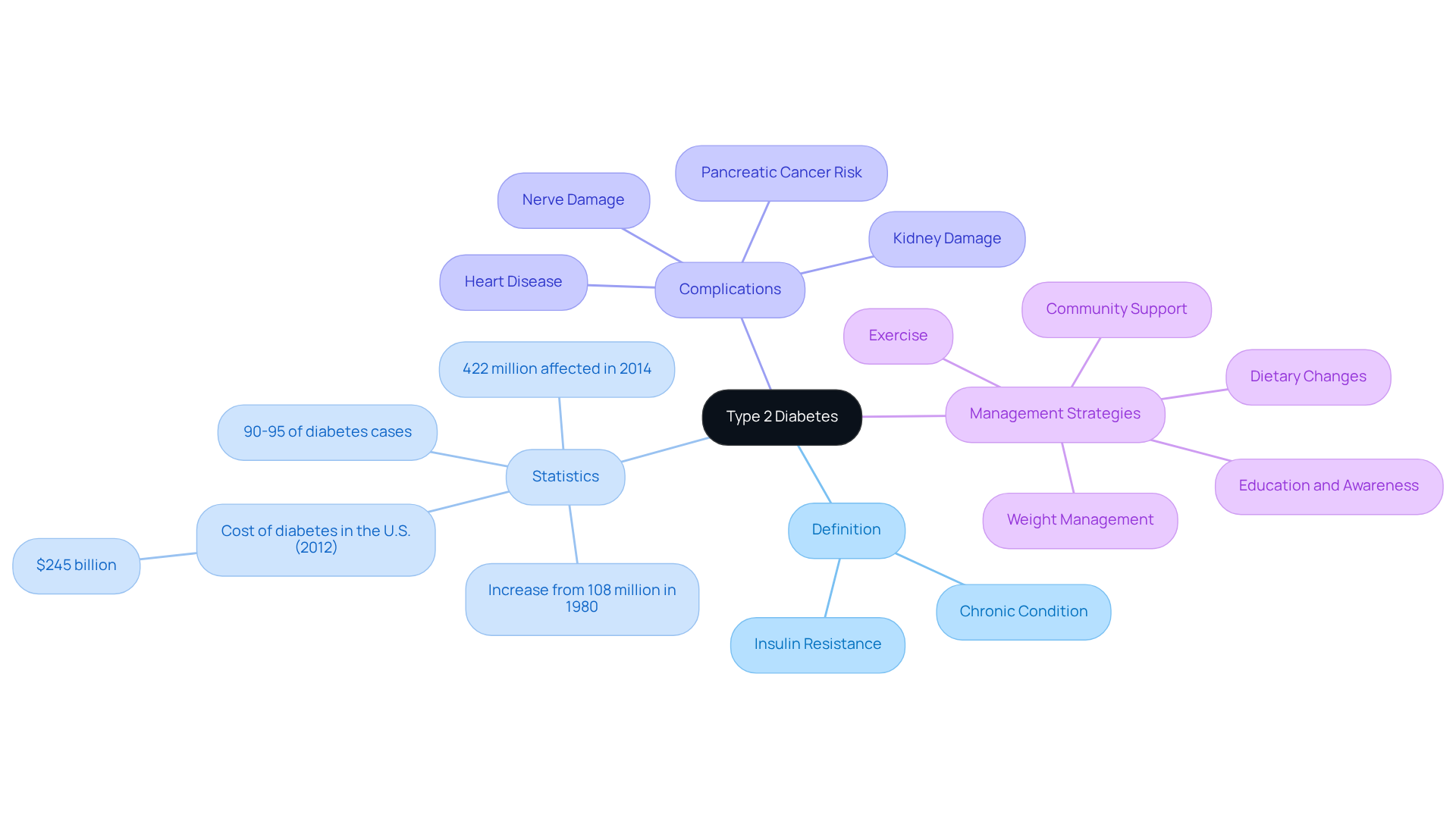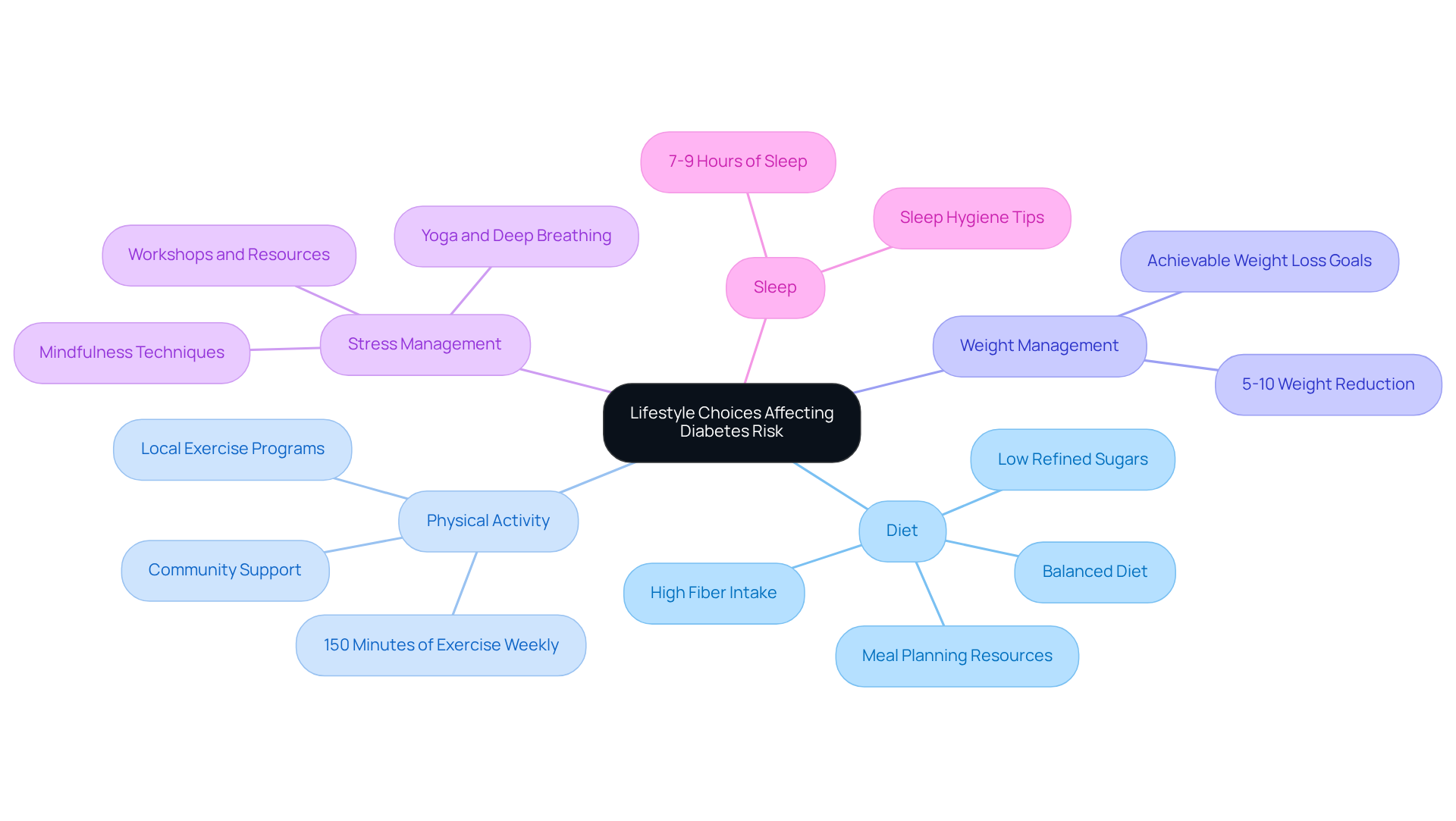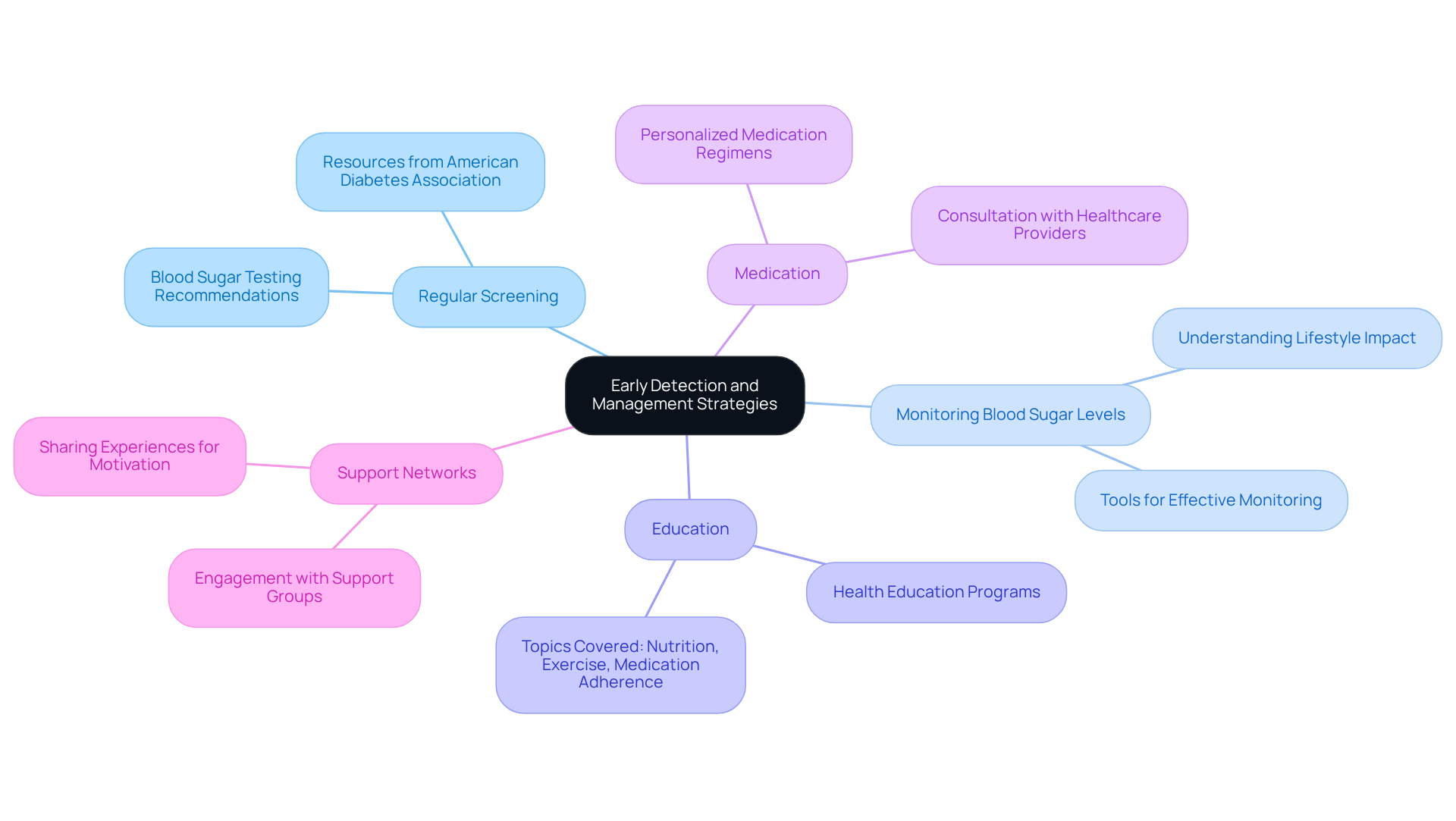Overview
Understanding the risk factors associated with Type 2 Diabetes is crucial for effective management. As you navigate this journey, it’s important to recognize that factors such as:
- Age
- Family history
- Obesity
- Physical inactivity
- Poor diet
can significantly increase your risk of developing this condition.
It's completely understandable to feel overwhelmed by this information, but please know that proactive lifestyle changes can make a significant difference. Regular monitoring and support can help mitigate these risks and improve your overall health outcomes. Remember, you’re not alone in this journey; there are resources available to assist you every step of the way.
Consider reaching out to healthcare professionals who can provide personalized guidance and support tailored to your needs. Together, we can work towards a healthier future.
Introduction
Understanding the intricacies of Type 2 diabetes is crucial. This condition accounts for a staggering 90-95% of diabetes cases worldwide, and it can feel overwhelming to navigate. Not only does it pose serious health risks like heart disease and kidney damage, but it also opens the door for proactive management through awareness of its risk factors.
As the statistics surrounding diabetes continue to rise, it’s understandable to feel concerned. You may wonder what specific lifestyle choices and genetic predispositions could significantly elevate your risk. The good news is that individuals can take charge of their health to mitigate these dangers. Remember, you’re not alone in this journey. We are here to support you every step of the way.
Define Type 2 Diabetes and Its Implications
Diabetes mellitus type 2 is a persistent condition where the body struggles to use insulin effectively, leading to insulin resistance. This can result in elevated blood sugar levels, which, over time, may pose serious health risks. It's understandable to feel concerned, especially when you learn that approximately 90-95 percent of diabetes cases worldwide fall into this category. This highlights the importance of recognizing it as a significant public health issue.
The complications associated with diabetes can be daunting, including heart disease, kidney damage, and nerve damage. However, proactive management can make a difference. By 2014, the number of individuals affected by diabetes had soared to 422 million globally, up from 108 million in 1980. These statistics are alarming, but recognizing symptoms such as increased thirst, frequent urination, and fatigue can empower you to seek early intervention.
Experts emphasize that managing insulin resistance is crucial in preventing complications related to diabetes type 2 risk factors. Uncontrolled blood sugar levels can impact various organs, but you're not alone in this journey. By understanding these implications, you can take informed steps toward effective management, improving your overall health outcomes.
As we launch our new resource hub for diabetes education, we invite you to subscribe for updates. Together, we can provide valuable resources and support to help you manage diabetes effectively. Remember, you are not alone—support is available every step of the way.

Identify Risk Factors for Type 2 Diabetes
The likelihood of developing Type 2 Diabetes is influenced by several important diabetes type 2 risk factors, which can significantly impact your health. At T2DSolutions, we are dedicated to helping you understand and navigate these challenges. Let’s explore these factors together:
- Age: If you are 45 or older, it's important to know that your risk for Type 2 Diabetes increases with age.
- Family History: Having a family history of high blood sugar can heighten your risk. If your parents or siblings have diabetes, it’s essential to recognize the genetic factors at play.
- Weight: Being overweight or obese is one of the most significant risk factors. If your body mass index (BMI) is 25 or higher, you may be at an increased risk of developing Type 2 Diabetes.
- Physical Inactivity: Physical inactivity, which is among the diabetes type 2 risk factors, refers to a lifestyle that includes little physical activity—less than three times a week—and can lead to insulin resistance, raising your chances of health issues related to blood sugar.
- Unhealthy Diet: Consuming a diet high in processed foods and sugars can lead to weight gain and insulin resistance. Making healthier dietary choices is crucial in managing your risk.
- Ethnicity: Certain ethnic groups, including African Americans, Hispanic Americans, Native Americans, and some Asian Americans, may have a higher predisposition to diabetes, highlighting the importance of understanding health disparities.
- Gestational Diabetes: If you experienced high blood sugar during pregnancy, it can be considered one of the diabetes type 2 risk factors that increases your likelihood of developing Type 2 Diabetes later in life. This risk can also extend to your child, who may face a higher likelihood of obesity and diabetes in the future.
Understanding these risk factors can empower you to assess your own vulnerability and take proactive steps to mitigate them. Simple, gradual lifestyle changes, like increasing physical activity and adopting a healthier diet, can significantly lower your risk of developing diabetes and improve your overall health. We offer resources and support programs to help you manage these challenges effectively. Remember, you're not alone in this journey—we are here to support you every step of the way.
Examine Lifestyle Choices Affecting Diabetes Risk
Lifestyle choices play a pivotal role in determining diabetes type 2 risk factors, making it important to understand how you can make positive changes. Here are some key areas to focus on:
-
Diet: Embracing a balanced diet that includes whole grains, fruits, vegetables, and lean proteins is essential for maintaining a healthy weight and enhancing insulin sensitivity. Nutritionists emphasize that a diet low in refined sugars and high in fiber can significantly aid in blood sugar control. You're not alone in this journey; this organization provides resources and guidance on meal planning to assist you in making healthier dietary choices.
-
Physical Activity: Engaging in regular exercise, such as walking, swimming, or cycling, is crucial for weight management and blood sugar regulation. Current guidelines recommend at least 150 minutes of moderate aerobic activity each week. It’s understandable to feel overwhelmed, but T2DSolutions offers information on local exercise programs and community support to encourage physical activity. Many individuals who incorporate consistent physical activity into their routines often experience improved glycemic control and overall health.
-
Weight Management: Maintaining a healthy weight is crucial for preventing diabetes-related issues. Studies show that even a small weight reduction of 5-10% can result in significant decreases in the likelihood of developing health complications. This is particularly important for those with a family history of diabetes or other risk factors. Remember, you are not alone; the organization can assist you in establishing achievable weight loss objectives and offer support through community resources.
-
Stress Management: Chronic stress can adversely affect blood sugar levels. Techniques such as mindfulness, yoga, and deep breathing exercises are effective strategies for managing stress and promoting emotional well-being. The organization provides workshops and resources to help you learn these stress management techniques, ensuring you have the support you need.
-
Sleep: Quality sleep is another critical factor. Research indicates that poor sleep patterns can increase the likelihood of diabetes. Aim for 7-9 hours of restorative sleep each night to support your metabolic health. The organization emphasizes the importance of sleep hygiene and offers tips for enhancing sleep quality, helping you to feel more rested and rejuvenated.
By making informed lifestyle choices and utilizing the resources available through T2DSolutions, you can significantly reduce your chance of developing Type 2 Diabetes by managing diabetes type 2 risk factors, leading to better health outcomes and an enhanced quality of life. Remember, we are here to support you every step of the way.

Explore Early Detection and Management Strategies
Early detection of Type 2 Diabetes is crucial for effective management and minimizing complications. It's understandable to feel overwhelmed, but there are key strategies that can help you navigate this journey with confidence:
-
Regular Screening: If you are at risk, consider undergoing regular blood sugar testing. The American Diabetes Association recommends starting testing at age 45, or even earlier if you are overweight or have other diabetes type 2 risk factors. This proactive approach can help detect prediabetes or glucose intolerance early, allowing for timely intervention. The organization offers resources and guidance to help you navigate the screening process effectively.
-
Monitoring Blood Sugar Levels: Keeping a close watch on your blood sugar levels empowers you to understand how your lifestyle choices impact your management. Regular monitoring can reveal patterns that inform dietary and activity adjustments, ultimately leading to better control of your blood glucose. T2DSolutions provides tools and support for effective monitoring practices.
-
Education: Engaging in health education programs can provide you with vital information for managing your condition effectively. These programs often cover important topics such as nutrition, exercise, and the significance of medication adherence, promoting a thorough understanding of how to manage your condition. This organization offers educational resources and programs designed specifically for newly diagnosed patients, enhancing your ability to take charge of your health.
-
Medication: For some individuals, lifestyle modifications alone may not be enough. Medications can play a crucial role in managing blood sugar levels, especially for those in more advanced stages of the condition. It's essential to consult with healthcare providers about the appropriate medication regimen for optimal management. The organization can assist in connecting you with healthcare professionals for personalized medication advice.
-
Support Networks: Engaging with support groups or healthcare professionals can provide emotional support and practical advice. Sharing experiences with others facing similar challenges can boost your motivation and resilience, making the journey of managing your condition feel less isolating. The organization facilitates the creation of support networks, helping you connect with others who understand your journey. With 29.1 million people in the U.S. having diabetes, including 8.1 million undiagnosed, building a support network is more important than ever.
By implementing these strategies and utilizing the resources available through T2DSolutions, you can take proactive steps to manage Type 2 Diabetes effectively by addressing diabetes type 2 risk factors, thus improving your overall health and quality of life. Remember, you're not alone in this journey; we are here to support you every step of the way.

Conclusion
Understanding Type 2 Diabetes and its associated risk factors is essential for effective management and the prevention of serious health complications. By recognizing the implications of this condition, you can take proactive steps to improve your health outcomes. The importance of addressing Type 2 diabetes risk factors cannot be overstated; it empowers you to make informed decisions about your lifestyle and health.
Throughout this article, we have highlighted key risk factors such as:
- Age
- Family history
- Weight
- Physical inactivity
- Dietary choices
These are critical components influencing the likelihood of developing Type 2 Diabetes. Additionally, we emphasize the importance of early detection through regular screening and monitoring of blood sugar levels. Education and support networks play a vital role in managing the condition effectively. These insights provide a roadmap for you to navigate your health journey with greater confidence and understanding.
Ultimately, taking action to mitigate diabetes risk factors is not just about preventing a diagnosis; it’s about enhancing your overall quality of life. By embracing healthier lifestyle choices, seeking regular screenings, and utilizing available resources, you can significantly reduce your risk of developing Type 2 Diabetes. It’s understandable that this journey may be challenging, but with the right support and information, you can take control of your health and live a fulfilling life. Remember, you're not alone in this journey; we are here to support you every step of the way.
Frequently Asked Questions
What is type 2 diabetes?
Type 2 diabetes is a persistent condition where the body struggles to use insulin effectively, leading to insulin resistance and elevated blood sugar levels.
What percentage of diabetes cases worldwide are type 2 diabetes?
Approximately 90-95 percent of diabetes cases worldwide fall into the category of type 2 diabetes.
What are the potential health risks associated with type 2 diabetes?
The complications associated with type 2 diabetes can include heart disease, kidney damage, and nerve damage.
How many people were affected by diabetes globally by 2014?
By 2014, the number of individuals affected by diabetes had soared to 422 million globally, up from 108 million in 1980.
What are some common symptoms of type 2 diabetes?
Common symptoms of type 2 diabetes include increased thirst, frequent urination, and fatigue.
Why is managing insulin resistance important?
Managing insulin resistance is crucial in preventing complications related to diabetes type 2 risk factors and helps control blood sugar levels to protect various organs.
What resources are available for diabetes education and support?
A new resource hub for diabetes education is available, providing updates and valuable resources to help individuals manage diabetes effectively.



